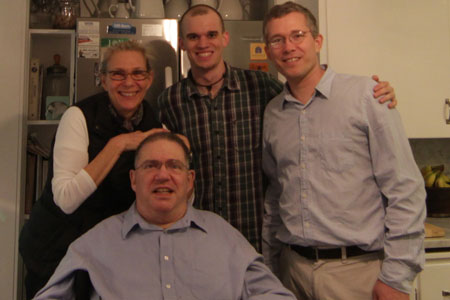Student takes aim at ’voicemail hell’
Frank Kelleher ’13 hopes to end “voicemail hell.”
That phrase has been dubbed to explain a common scenario for paralyzed people—their inability to terminate a call on their smartphone when the call goes to voicemail. This occurs because quadriplegics don’t have use of their arms to push a button on their phone to end the call, and currently there is no such voice recognition system to assist.
“Some carriers end the call in a few minutes, but others will not end for 20 minutes,” said Kelleher, a Visual and Media Arts major. “Even if callers don’t want to leave a voicemail, they’re essentially leaving a very long voicemail.”
That can mean life or death in some situations.
“Terminating a call is essential, especially if I need the phone for another reason, such as an emergency,” said Dr. Gary Witman of Providence, Rhode Island, who was paralyzed in a bizarre accident on Narragansett Beach in August 2010. “If I’m stuck in voicemail hell, there’s nothing I can do.”
Witman made those comments in a video interview with Kelleher, which was displayed March 1 at the widely popular TED 2013 Conference in Long Beach, California—an event with 1,800 participants and ticket prices at $7,500.
Kelleher, who works as an intern at Boston Children’s Hospital producing informational videos, was approached by TED organizers just days before the event and asked to interview Witman.
The video is promoting the creation of a new smartphone app that would prevent paralyzed people from entering voicemail hell.
Kelleher, a native of Westfield, Massachusetts, said his previous video production experience largely involved music videos and student films.
“Doing something like this was way more powerful,” said Kelleher, who filmed Witman at his home. “He had a big smile on his face the whole time. It tugged at my heart to see how positive this man could be after such a traumatic experience.”
Witman, a grandfather and emergency room physician at Good Samaritan Hospital in Brockton, Massachusetts, was paralyzed by a large wave in an accident more than two years ago.
“I was 25 to 30 feet from shore,” Witman said in the video. “I bent down to pick up a hat and a wave hit me in the back of my neck. I immediately became paralyzed.”
Witman’s wife, Deedee, and bystanders saved him from the waist-deep water as he began to drown.
In the video, Witman makes a plea to TED participants to support the ongoing development of the smartphone app.
“Tetraplegics…have a need for independence,” he said. “They have a need for safety and security.”

Categories